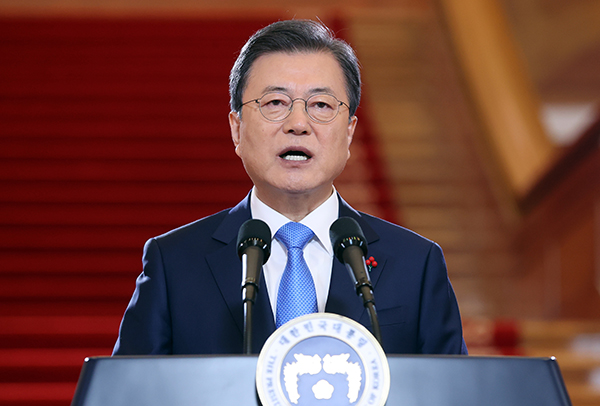The change comes after pushing a senseless phase-out policy for years
With just 12 days left until the March 9 presidential election, President Moon Jae-in changed his stance on nuclear power, calling nuclear power a main source of electricity over the next 60 years. The main opposition People Power Party (PPP) attacked Moon for interfering in the upcoming election by shifting his tone on his failed nuclear phase-out policy, which is one of the top issues in South Korea’s presidential election.
“Over the next 60 years, while nuclear power plants continue to operate, nuclear power plants should be fully utilized as a main base source of electricity,” Moon told a meeting on the stable supply of power on Friday, according to presidential spokesperson Park Kyung-mee.
Construction of four nuclear reactors, Shin-Hanul No. 1 and No. 2, as well as Shin-Kori No. 5 and No. 6, have been delayed due to safety inspections and other issues. Industry insiders believe that this was due to Moon’s nuclear phase-out policy. Moon urged officials to make efforts to gradually start operations at the four nuclear reactors, because safety standards for operations have increased, Park said.
The construction of the Shin-Hanul units was finished in the first year when Moon came to power. They were expected to begin operating around June 2017 but they received approval to operate last year. Experts believe that the total damage of the government’s nuclear phase-out policy exceeds 1.4 trillion won ($1.1 billion) if damage to other private companies and institutions is included. The government also is delaying the start of operation of Shin Hanul units 1 and 2 even after they were finished, which also contributes to the damage.
Moon also said that it is essential to acquire leading nuclear reactor technology. “There are countries that want to import South Korean nuclear reactors so exporting them is an obvious thing to do,” Moon said.
Moon’s comments came during a meeting to discuss the energy shortage amid soaring gas and oil prices amid the Ukrainian crisis.
Moon’s latest comments clearly differ from the stance that he took during his five years in office. One of the first policies that the current Moon Jae-in administration pushed ahead with was the phasing out of nuclear power, which he declared was for safety reasons. Many experts warned that nuclear power is a reliable and efficient power source, especially in a small country such as South Korea. Despite these warnings, Moon was able to expedite the phase-out process since the country’s sole nuclear power company Korea Hydro & Nuclear Power (KHNP) is technically owned by the government.
While other major countries such as the United States, Canada, and France all extended the operating licenses for their existing nuclear power plants, South Korea has not extended the life of a single unit among the 24 plants operating in the country. Instead, the Moon administration pursued a policy of slowly phasing out the country’s nuclear power plants.
Under Moon, South Korea shut down the Wolsong power plant Unit 1 prematurely, and the government’s alleged involvement in manipulating the economic feasibility study behind the plant shutdown is under investigation. The Moon administration also faced criticism after it was found out that they reviewed ways to build nuclear power plants in other countries, including North Korea, which is an idea that contradicts its policy of phasing out of nuclear power for safety reasons.
Hwang Kyu-hwan, a spokesperson from the PPP, released a statement on Friday accusing the president of trying to attack the presidential candidate from the opposition party by mentioning politically sensitive issues.
“He never listened to people who called for giving up its nuclear phase-out policy for years, and now he is arguing that nuclear power should be a main base source of electricity as they are faced with the crisis followed by what is going on in Ukraine,” Hwang said. “He should honestly acknowledge that his nuclear phase-out policy has failed the people and that we have nothing else than nuclear power to depend on during the energy crisis.”
Hwang argued that the president and the presidential Blue House said that they will keep their political neutrality ahead of the election but are directly interfering with the election. “The Blue House refuted the opposition presidential candidate directly by defending policies such as the nuclear phase-out policy,” he said. “They should just honestly say that they are afraid of the verdict that will be rendered.”
Yoon Seok-youl, the presidential candidate from the PPP, said that the Moon administration’s nuclear phase-out policy completely failed and is not based on science. He promised that he will scrap the policy and use more nuclear power. Lee Jae-myung, the presidential candidate from the ruling Democratic Party, on the other hand, said that rather than totally drifting away from nuclear power as the Moon administration did, he will “slowly” reduce South Korea’s reliance on nuclear power.
Meanwhile, Korea Electric Power Corporation, the state-run electric utility responsible for the transmission and distribution of electricity in South Korea, recorded an operating loss of 5.86 trillion won ($4.86 billion) in 2021. The loss amounted to 4.73 trillion won ($3.92 billion) just during the fourth quarter of last year. Experts said that the operation of nuclear power plants was lower than it was originally scheduled due to the nuclear phase-out policy, and the company spent too much buying renewable energy products to substitute the loss of nuclear power.
Just as Moon’s term in office is ending, the president appears to be realizing the value of nuclear power to South Korea.


